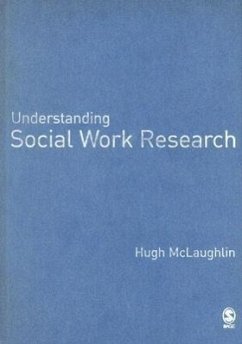Main description:
`An excellent introductory textbook for social work students that effectively links social work theories and concepts to research' - Vivienne Barnes, Coventry University
This excellent new textbook offers a comprehensive introduction to the nature of social work research. The book clearly demonstrates how research-mindedness is key to improving individual and collective social work practice, helping practitioners to effectively navigate the complex issues they face on a daily basis.
The book satisfies the curriculum benchmarks for social work training and considers research in relation to a number of important social work themes, including ethics, anti-oppressive practice, service user research, evidence-based practice and interdisciplinary work. The book will help readers:
critically reflect on their own social work practice
assess, appraise and apply research
effectively advocate on behalf of service-users
confidently engage in debates about the profession
reflect on legislative and policy developments.
Understanding Social Work Research is clear and accessible, containing reflective questions and practice examples illustrating the links between research and social work practice. This book will be essential reading for all social work trainees, and will provide invaluable support for postgraduate students and practitioners wishing to consolidate their understanding of social work research.
Hugh McLaughlin is the Director of Social Work and Social Policy at Salford University.
Table of contents:
Why Research for Social Work?
The Research Business
The Philosophy of Social Research
Ethical Issues in Social Work Research
Evidence-based Practice
Panacea or Pretence?
Service Users and Research
The Next Frontier
Research and Anti-oppressive Practice
Interdisciplinary Contributions to Social Work and Social Work Research
The New Orthodoxy
Getting Research into Practice
Whither Social Work Research
Challenges for the Third Millennium
Hinweis: Dieser Artikel kann nur an eine deutsche Lieferadresse ausgeliefert werden.
`An excellent introductory textbook for social work students that effectively links social work theories and concepts to research' - Vivienne Barnes, Coventry University
This excellent new textbook offers a comprehensive introduction to the nature of social work research. The book clearly demonstrates how research-mindedness is key to improving individual and collective social work practice, helping practitioners to effectively navigate the complex issues they face on a daily basis.
The book satisfies the curriculum benchmarks for social work training and considers research in relation to a number of important social work themes, including ethics, anti-oppressive practice, service user research, evidence-based practice and interdisciplinary work. The book will help readers:
critically reflect on their own social work practice
assess, appraise and apply research
effectively advocate on behalf of service-users
confidently engage in debates about the profession
reflect on legislative and policy developments.
Understanding Social Work Research is clear and accessible, containing reflective questions and practice examples illustrating the links between research and social work practice. This book will be essential reading for all social work trainees, and will provide invaluable support for postgraduate students and practitioners wishing to consolidate their understanding of social work research.
Hugh McLaughlin is the Director of Social Work and Social Policy at Salford University.
Table of contents:
Why Research for Social Work?
The Research Business
The Philosophy of Social Research
Ethical Issues in Social Work Research
Evidence-based Practice
Panacea or Pretence?
Service Users and Research
The Next Frontier
Research and Anti-oppressive Practice
Interdisciplinary Contributions to Social Work and Social Work Research
The New Orthodoxy
Getting Research into Practice
Whither Social Work Research
Challenges for the Third Millennium
Hinweis: Dieser Artikel kann nur an eine deutsche Lieferadresse ausgeliefert werden.








